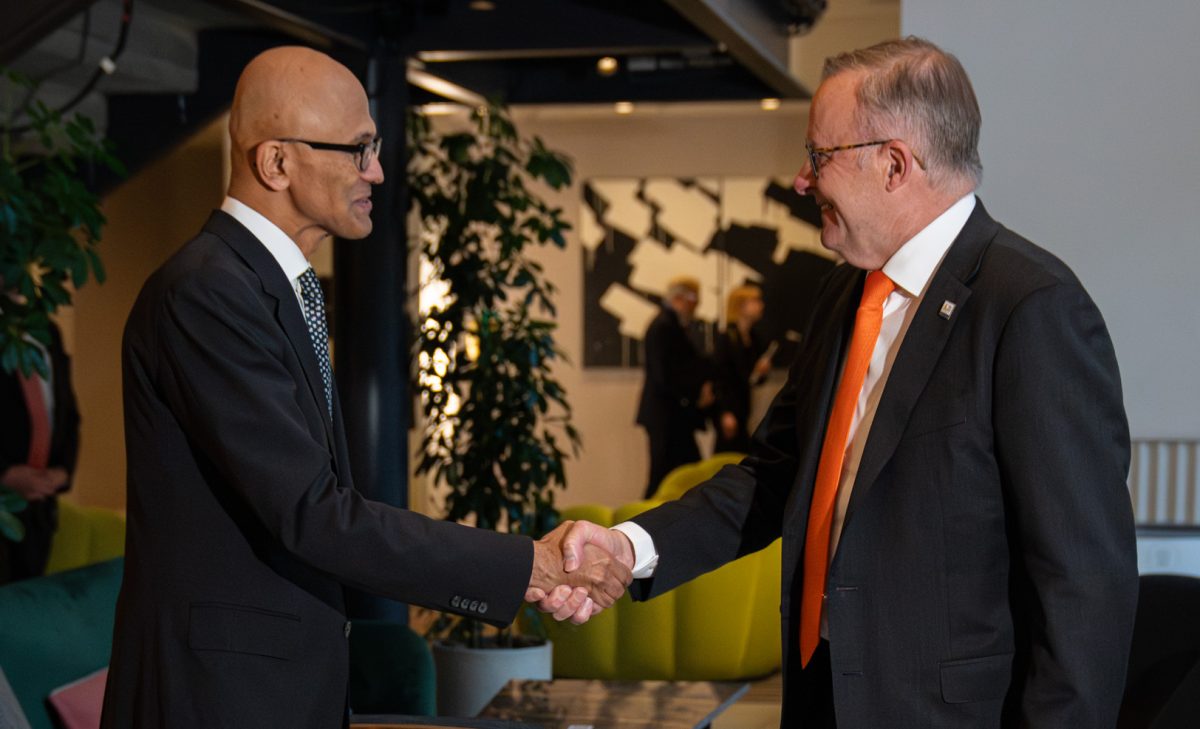
Microsoft CEO Satya Nadella and Anthony Albanese at the APEC Economic Leaders Meeting in San Francisco. Photo: Anthony Albanese X.
The Federal Government has announced it will “explore safe and responsible use of generative artificial intelligence in the public service”, in partnership with Microsoft, through the Digital Transformation Agency.
Prime Minister Anthony Albanese made the announcement with Microsoft chairman and CEO Satya Nadella in San Francisco on the sidelines of the APEC gathering on Thursday last week (16 November).
The government will conduct a six-month trial from January next year of Microsoft 365 Copilot, allowing APS staff to test new ways to innovate and enhance productivity.
For its part, Microsoft will provide digital training to help participants develop their AI skills and literacy.
Last month, Microsoft announced a $5 billion investment in Australia to enhance digital infrastructure, skills, cybersecurity and AI capabilities.
However, the government’s investment in the six-month trial has not yet been disclosed. But the PM could hardly contain his delight.
“By strengthening our partnership with Microsoft, we are charting a course for the future of public service – one where generative AI is used responsibly to enhance the work of the APS in delivering for Australians without compromising on safety,” he said.
Finance and Public Service Minister Katy Gallagher added in her praise to the statement.
“AI is emerging as a widely used technology and presents many opportunities for government and the way it delivers crucial services to the Australian community, but we must adopt it in a safe and controlled way,” she said.
“This exciting pilot will support the government’s APS reform agenda by identifying how we can safely use this technology to improve our work and service delivery but do so in a way that is controlled and allows us to learn the lessons with minimal impact on existing processes and services.”
That’s all pretty exciting – boldly going, new frontiers and all that.
But the announcement from the United States of the six-month Microsoft trial appears to have caught Australian AI providers by surprise.
And they’re a little miffed that the government might not have first thoroughly investigated options to source generative AI technology from within Australia.
The next day (17 November), Independent ACT Senator David Pocock took up their cause during Senate question time.
He asked Senator Gallagher how many Australian tech companies were given the opportunity to tender for this pilot.
“The copilot trial arrangement with Microsoft was initiated through existing arrangements with Microsoft,” she replied.
“That procurement arrangement was in place with the DTA and Microsoft already, so it’s building on that existing arrangement.”
Senator Pocock had a supplementary question.
“Minister, are you aware that one of our local Canberra companies, Trellis Data, has the same capability and ability to do this?” he asked.
“How does this square with the Labor government’s election commitment that the Albanese government wants to ensure that more Australian businesses have the chance to benefit from contracts that deliver the goods and services the Commonwealth needs to support Australians?”
The Minister replied: “I think there are going to be plenty of opportunities for businesses in this area. The DTA has released a request for information, RFI, through AusTender to gain an understanding of generative artificial intelligence services and support in the market. I think there’s going to be no shortage of opportunities for businesses, including local businesses.”
Senator Pocock had a second supplementary.
“It’s very concerning that if you invest $5 billion as a multinational you then get a contract for AI when there are Australian companies that can do the exact same thing,” he said.
“The draft exposure legislation for the Defence trade controls amendment would prohibit Australian companies from selling their AI tech to a wide range of countries,” Senator Pocock said.
“Is this restriction of Australian AI exports related to the government’s new partnerships with Microsoft?”
The Minister said she didn’t believe it was related but took the question on notice before repeating that she expected business opportunities would flow to local companies as a result of the Microsoft trial.
But some tech insiders share Senator Pocock’s concern over this.
The consultation period for the Defence Trade Controls Amendment Act 2023 draft exposure bill was very short (7 November to 17 November), particularly considering the long-lasting implications for Australia’s capacity to build sovereign AI technologies.
If Australia ceded its AI capability to American companies, then it would hardly have a strong local AI capability should the US change direction in the future.
Everyone acknowledges the need for fuel security to keep our country moving.
Should we not start thinking about AI security in the same way?
It is, after all, already beginning to consume everything we do.
These are all seriously important issues and well done to Senator Pocock for not allowing the government to ignore them.
But I’ll give this column’s last word to the Canberra-based AI company the Senator name-dropped in the Senate chamber.
We asked Trellis Data for a comment.
A spokesperson said: “Trellis Data is Australian-owned and already providing leading-edge AI technology. We would hope that as part of this process, the Federal Government will look to partner with a sovereign AI company and explore the benefits of this critical future technology alongside their international options.”
Original Article published by Chris Johnson on Riotact.










